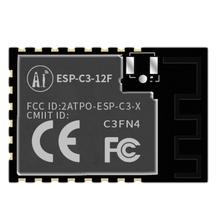ESP32-C3: Difference between revisions
Brian Wilson (talk | contribs) |
Brian Wilson (talk | contribs) |
||
| Line 33: | Line 33: | ||
Plug in the board and figure out what port it shows up on. | Plug in the board and figure out what port it shows up on. | ||
==== Mac OS ==== | |||
On the Mac, where it does not work. | On the Mac, where it does not work. | ||
| Line 38: | Line 40: | ||
ls /dev/tty.* | ls /dev/tty.* | ||
/dev/tty.Bluetooth-Incoming-Port /dev/tty.usbserial-0001 | /dev/tty.Bluetooth-Incoming-Port /dev/tty.usbserial-0001 | ||
==== Windows ==== | |||
On Windows, after installing the CP2102 driver from Silicon Labs, | On Windows, after installing the CP2102 driver from Silicon Labs, | ||
and the pyserial module, | |||
conda activate esphome | |||
conda install pyserial | |||
python esphome.py --port com4 erase | |||
== Coolest feature of this chip? == | == Coolest feature of this chip? == | ||
Revision as of 00:46, 24 May 2022

I am interested in RISC V and this seemed like a good way to get my hands on one. (Or 5)
I have 5 AI-Thinker ESP-C3-12F chips and a DOITING programmer thingie that I can pop them into. It's like this one, I don't remember where I bought it. It breaks out the pins and has a ESP-01S 2x4 pin socket and gives me a USB connection.
Single core processor, 4MB flash, 400K ram
Development options
Suggestions https://github.com/laris/rust-embedded-study-esp32-c3
Rust and Tock https://github.com/tock/tock Looks interesting but clearly it's early days for this one. I will get my feet under me first.
Micropython https://micropython.org/download/esp32c3-usb/ This is the obvious starting point for me because it's Python.
ESP-IDF This is probably the best option for serious work for example sticking a C3 in a light switch.
Arduino https://github.com/espressif/arduino-esp32 The Arduino option is the most practical but dull. :-)
Micropython
Download esptool.py from [email protected]:espressif/esptool.git
Plug in the board and figure out what port it shows up on.
Mac OS
On the Mac, where it does not work.
ls /dev/tty.* /dev/tty.Bluetooth-Incoming-Port /dev/tty.usbserial-0001
Windows
On Windows, after installing the CP2102 driver from Silicon Labs, and the pyserial module,
conda activate esphome conda install pyserial python esphome.py --port com4 erase
Coolest feature of this chip?
I2S
Compatible with old Esp12F?
6 channels of PWM
BLE 5.0?
RTC + 4 different power modes
Temperature sensor